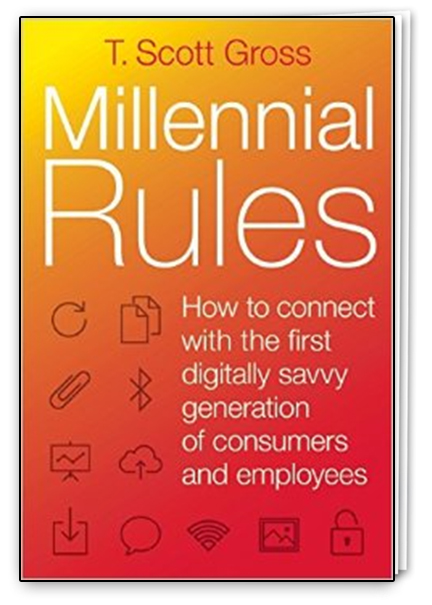INSIDER: Millennial Rules
Stephen Bell, MBA Candidate

In his iconic novel, War of the Worlds, H. G. Wells depicts an alien invasion the likes of which no one could imagine. Big, grey creatures from Mars show up on Earth one day. They wreak havoc on the local population, causing a great exodus of people. By the end of the book, all of London is completely destroyed.
While not as fearsome or destructive as the one depicted by the old English science fiction writer, T. Scott Gross insists that we too are experiencing a kind of alien invasion. A key issue with our invasion is that many people don’t even realize it is happening, and this one is for real. The book, Millennial Rules, warns of the growing number of millennials entering the workforce: thousands per day. While they look and sound like members of generations of the past, Gross warns that any company who treats them as such will experience disastrous consequences. From Gross' book, we see how the business world, in general, and the sales, in particular, may need to change in order to connect the millennial generation.
THINK POINT #1: Don't Sell Anything
The first thing that we must realize about millennials (and this goes for every generation to some extent) is the fact that they don’t want you to sell them anything. When a millennial is confronted by someone trying to sell them something, he or she almost immediately becomes closed off. Instead of seeing your real estate sales role as a sales role, consider seeing the role as a customer advocate. Gross advises sales people to become invisible to clients and customers, only showing up when they actually need something or have a question. He also encourages you to use the FUSE model when it comes to your clients:
- Friend: We’ve all heard, “if time allows, spend the most time befriending your client.” Don’t get me wrong, this stage is crucial for making the client feel comfortable, but as a general rule, millennials don’t want to spend as much time befriending work acquaintances as previous generations. Millennials came to your business for a reason, and they prefer to get to that reason as soon as possible. If millennial walks in, greet her with a smile, but don’t be surprised if she isn’t looking for a long conversation.
- Uncover: Only after trust has been established is the client likely to share information with you. This step will be easier with millennials since they want to get to the point faster and are used to sharing openly. However, they do not share deeply about themselves. While they will be more willing to let you know what they’re looking for, you have to dig harder and find out what the client is specifically seeking.
- Solve: To truly differentiate yourself as a real estate professional, don’t just match a client with property. Take the time to find the best possible solution. With millennials, Gross points out that it is important to sell benefits,not features. What’s the difference? Selling a feature is saying “this house has a fireplace,” or “this office has a window.” Millennials are all about the experience in life, so communicating the experience will bear fruit. Say things like “after a long hard day of work in the winter, you’ll be able to come home and relax by the fire,” or “not only can you see your house from here, but research shows that people with a better office view are 20% more productive.” These statements will better engage and motivate a millennial.
- Execute: A last step and first step in one, execution is more about caring than selling. Follow up with a client after the sale, and do so appropriately. Don’t send an email to millennials. Communicate through the media they use. Send them a short text saying that you hope they like their new place, and telling them not to hesitate to text or call if they have any concerns. Phone calls may be acceptable, but most millennials don’t bother answering unless the caller is someone close. If you do call, don’t leave a voicemail. It will be ignored.
THINK POINT #2: Technology Excites
Millennials learned technology in a completely different way than every other generation. Instead of learning as they got older, most millennials learned technology from birth. Millennials are both fearless and masters of adaptation when it comes to technology. Consequently, technology is necessary in attracting millennial business. Gross points out that there are at least two specific ways a business should use technology.
First off, Gross recommends using technology to become invisible. As stated above, customers don’t want you to sell them anything. Internet sites, like Zillow, allow customers to cut out a step in the sales process. Therefore, capitalize on this desire. Follow the example of online shopping which is powerful because it puts the client in the driver seat. There are few things that millennials like more. If you are expecting millennials to call you to find houses, change the way you’re doing business. Adapt your website. Let customers view listed properties right on your website. Clients will still need a realtor, especially when it comes to navigating the paperwork. Putting the search directly in clients’ hands will improve the process for both you and the client. Even with the search in the clients’ hand, your job is to search out great properties that you think would fit them best.
When it comes to technology, there may be no hotter topic than social media. Gross reveals that almost 40 percent of millennials use social media, and that 60 percent of people on social networks write reviews and share them with friends. It’s your job to do everything you can to ensure that social media conversations are positive. First off, listen. Social media will be powerful because you’ll be able to listen to what people are saying about your company. Look for people tweeting about needing a new realtor or posting a status that they’re looking for a new house. Don’t just tell people to like or follow you, give them a reason. Post the very first listings on your page so followers get to see them first. Last but not least, realize that social media is all about visuals. Post pictures of properties on the market. Include short video testimonials. Don’t make them read, let them experience.
THINK POINT #3: "I Want It My Way"
Speaking of technology, not only should you be aware of the ways in which you can use it, you must be mindful of the new opportunities it provides. Millennials are more likely than any other generation to do online research before purchasing a product (Gross 2012). Guidance is found on the internet; bargains are found when dealing with people.
Millennials negotiate everything. They know that hundreds of different properties exist with hundreds of different benefits. They will compare every house on the market if it means being able to bargain a lower price.

Realizing and accepting millennials’ inclination to negotiate is the first step. Some helpful ideas to consider in addressing this growing phenomenon include: Establish yourself as an expert. If a client perceives that you don’t know your commercial or residential market as well as you should, this will be an open invitation for the client to expect more.
Importantly, millennials, more than any other generation, can’t stand waiting (Gross 2012). They grew up with instant results such as twenty-four hour tech support and movies streamed on demand. Making negotiations quick and easy is a must for this generation. The longer the sales process, the more time millennials will have to bargain. You need to effectively gauge what they want, so you can filter out undesired properties. You may have to do more behind-the-scenes work to find properties and manage paperwork. A quick and easy experience for a millennial is a sure-fire way to drive satisfaction and increase the personal recommendations, in person and online.
Millennial Rules is a great book for anyone looking to learn about selling to millennials. The book also deals with general rules pertaining to other generations. Gross’ recommendations may have great consequence. Once you understand how to best market and relate to millennials, you will immediately be plugged into the fastest-growing generation, in the workforce and among home-buying prospects. In relating to the client, using technology, and preparing to negotiate, you will assuredly leave clients with more positive feelings and significantly influence their decision to continue to tap your services for their real estate needs.
. . . . . . . . . . . . . . . . . . .
Recommended Reading
Gross, T. S. (2014), Millennial Rules: How to Connect with the First Digitally Savvy Generation of Consumers and Employees, New York, New York: Skyhorse Publishing.
. . . . . . . . . . . . . . . . . . .
About the Author
Stephen Bell, MBA Candidate, Baylor University
Stephen is a graduate business student from San Antonio, Texas. He earned his bachelor's degree in Biology from Baylor University. Stephen is an avid sport's fan and enjoys attending many different Baylor athletic events. Previous jobs of his include positions in the food industry, as well as public safety. Stephen is currently pursuing an MBA with a concentration in healthcare administration.